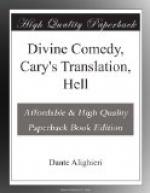The other leprous spirit heard my words,
And thus return’d: “Be Stricca from
this charge
Exempted, he who knew so temp’rately
To lay out fortune’s gifts; and Niccolo
Who first the spice’s costly luxury
Discover’d in that garden, where such seed
Roots deepest in the soil: and be that troop
Exempted, with whom Caccia of Asciano
Lavish’d his vineyards and wide-spreading woods,
And his rare wisdom Abbagliato show’d
A spectacle for all. That thou mayst know
Who seconds thee against the Siennese
Thus gladly, bend this way thy sharpen’d sight,
That well my face may answer to thy ken;
So shalt thou see I am Capocchio’s ghost,
Who forg’d transmuted metals by the power
Of alchemy; and if I scan thee right,
Thus needs must well remember how I aped
Creative nature by my subtle art.”
CANTO XXX
What time resentment burn’d in Juno’s
breast
For Semele against the Theban blood,
As more than once in dire mischance was rued,
Such fatal frenzy seiz’d on Athamas,
That he his spouse beholding with a babe
Laden on either arm, “Spread out,” he
cried,
“The meshes, that I take the lioness
And the young lions at the pass:” then
forth
Stretch’d he his merciless talons, grasping
one,
One helpless innocent, Learchus nam’d,
Whom swinging down he dash’d upon a rock,
And with her other burden self-destroy’d
The hapless mother plung’d: and when the
pride
Of all-presuming Troy fell from its height,
By fortune overwhelm’d, and the old king
With his realm perish’d, then did Hecuba,
A wretch forlorn and captive, when she saw
Polyxena first slaughter’d, and her son,
Her Polydorus, on the wild sea-beach
Next met the mourner’s view, then reft of sense
Did she run barking even as a dog;
Such mighty power had grief to wrench her soul.
Bet ne’er the Furies or of Thebes or Troy
With such fell cruelty were seen, their goads
Infixing in the limbs of man or beast,
As now two pale and naked ghost I saw
That gnarling wildly scamper’d, like the swine
Excluded from his stye. One reach’d Capocchio,
And in the neck-joint sticking deep his fangs,
Dragg’d him, that o’er the solid pavement
rubb’d
His belly stretch’d out prone. The other
shape,
He of Arezzo, there left trembling, spake;
“That sprite of air is Schicchi; in like mood
Of random mischief vent he still his spite.”
To whom I answ’ring: “Oh! as thou
dost hope,
The other may not flesh its jaws on thee,
Be patient to inform us, who it is,
Ere it speed hence.”—“That
is the ancient soul
Of wretched Myrrha,” he replied, “who
burn’d
With most unholy flame for her own sire,
“And a false shape assuming, so perform’d
The deed of sin; e’en as the other there,
That onward passes, dar’d to counterfeit
Donati’s features, to feign’d testament
The seal affixing, that himself might gain,
For his own share, the lady of the herd.”




